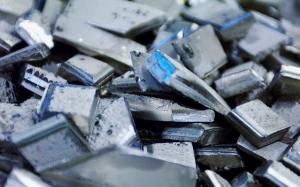Refined Nickel Market Forecast 2025-2035: Comprehensive Analysis And Growth Opportunities
The global refined nickel market is expected to grow at a CAGR of 4.8%, reaching a volume of over 2 billion tons during the forecast period from 2022 to 2030
CA, UNITED STATES, April 30, 2025 /EINPresswire.com/ -- In the world of industrial metals, refined nickel has carved a crucial niche, standing at the crossroads of metallurgy, energy transition, and advanced manufacturing. As industries strive for cleaner technologies and resilient infrastructure, refined nickel is increasingly recognized for its strategic value. From stainless steel production to electric vehicle batteries, this versatile metal plays a foundational role in the global economy.What is Refined Nickel?
Refined nickel refers to high-purity nickel that has undergone complex processing to remove impurities and meet stringent industrial standards. Typically containing more than 99.8% nickel, it is produced through processes such as pyrometallurgy and hydrometallurgy, often depending on the type of nickel ore—sulfide or laterite. The final product may appear as cathodes, briquettes, or powders and serves as a feedstock for alloy manufacturing, plating, and energy storage technologies.
Request for a Sample Copy: https://www.marketresearchfuture.com/sample_request/7868
Production and Supply Landscape
Nickel is mined in over 25 countries, with Indonesia, the Philippines, Russia, Canada, and Australia being the largest producers. However, not all mined nickel becomes refined nickel. The transition from ore to refined metal requires advanced infrastructure and technology.
The refining process often includes:
Smelting (for sulfide ores): Concentrated ore is roasted and smelted to extract nickel matte, followed by converting and refining.
HPAL (High Pressure Acid Leach for laterite ores): Uses sulfuric acid under pressure to extract nickel and cobalt from limonite ores.
Electrowinning or electrorefining: Produces high-purity nickel suitable for batteries and electronics.
China remains the largest refiner of nickel, leveraging both imported ores and intermediate products such as nickel pig iron (NPI) and mixed hydroxide precipitate (MHP). The global refining capacity has expanded significantly due to rising demand from electric vehicles (EVs) and energy storage systems.
Key Applications of Refined Nickel
Stainless Steel (65–70%)
The most significant use of refined nickel is in the production of stainless steel. Nickel enhances corrosion resistance, strength, and ductility, making it essential for kitchenware, construction, medical equipment, and chemical processing.
Battery Materials (15–20%)
Refined nickel is a critical component of lithium-ion batteries, particularly in nickel-cobalt-manganese (NCM) and nickel-cobalt-aluminum (NCA) chemistries used in EVs. Nickel-rich batteries offer higher energy density and longer range, driving a surge in demand.
Alloys and Superalloys
High-performance alloys used in aerospace, turbines, and marine applications depend on refined nickel for thermal stability and strength under extreme conditions.
Electroplating
Nickel electroplating protects surfaces against corrosion and enhances aesthetic appeal in automotive, electronics, and jewelry sectors.
Catalysts and Electronics
Refined nickel is used in catalysts for hydrogenation and desulfurization, as well as in electronic components and sensors.
Buy Now - https://www.marketresearchfuture.com/checkout?currency=one_user-USD&report_id=7868
Nickel and the Energy Transition
As the world accelerates toward net-zero emissions, refined nickel is emerging as a green metal. Its role in EV batteries and renewable energy infrastructure aligns it with global decarbonization goals. High-nickel chemistries, particularly NCM 811 and NCA, offer superior energy density and cost-efficiency, reducing reliance on cobalt—a more expensive and ethically contentious material.
The International Energy Agency (IEA) projects that demand for nickel in batteries could grow by over 20-fold by 2040 under a net-zero scenario. To meet this surge, investments in refining capacity, especially for battery-grade Class 1 nickel, are intensifying.
Market Trends and Pricing Dynamics
The global refined nickel market is highly sensitive to supply chain dynamics, geopolitical events, and technological shifts. In recent years, the market has witnessed:
Increased volatility: Driven by the Ukraine conflict, Indonesia’s export policies, and Chinese demand.
Shift in trade flows: China and Indonesia are increasingly dominating the value chain from mining to refining.
Supply challenges: Class 1 nickel suitable for batteries is relatively scarce compared to lower-grade NPI used in steelmaking.
As of 2024, nickel prices remain under pressure due to oversupply in certain segments and a slowdown in EV sales growth. However, long-term forecasts remain bullish due to electrification and infrastructure expansion.
Sustainability and ESG Considerations
Refined nickel production faces scrutiny over its environmental and social impact, especially when sourced from laterite ores using energy-intensive methods. Key concerns include:
Carbon footprint: Laterite refining via HPAL or ferronickel smelting emits high levels of CO₂.
Water use and tailings: Improper waste management can cause ecological damage.
Human rights: Mining in regions with weak governance can lead to labor and community issues.
To address these, the industry is adopting ESG frameworks, investing in low-carbon refining technologies, and improving traceability. Projects that use renewable energy, recycled nickel, and improved waste handling are increasingly favored by both regulators and investors.
The Road Ahead
Refined nickel is no longer just a metal for steel—it’s a strategic resource for the 21st century. As demand shifts from traditional uses toward clean energy applications, the pressure to build a responsible, resilient, and transparent nickel supply chain is mounting.
Looking forward, innovation in recycling, alternative extraction methods, and green refining processes will shape the next phase of nickel’s journey. Stakeholders—from miners and refiners to automakers and governments—must collaborate to ensure nickel not only powers progress but does so sustainably.
MRFR recognizes the following Refined Nickel Companies - Norilsk Nickel, Vale, BHP, Jinchuan Group International Resources Co. Ltd. ,Glencore
Refined nickel is at the heart of modern infrastructure and the green energy revolution. With a unique combination of durability, energy density, and versatility, it supports critical industries ranging from construction to clean transportation. As global economies pivot toward sustainability and innovation, refined nickel's importance will only deepen—making it a metal to watch and invest in.
Browse Related Reports:
Nickel Hydroxide Market - https://www.marketresearchfuture.com/reports/nickel-hydroxide-market-1054
Ukraine Nickel Market - https://www.marketresearchfuture.com/reports/ukraine-nickel-market-42169
Market Research Future
Market Research Future
+ +1 855-661-4441
email us here
Visit us on social media:
LinkedIn
Facebook
X
Legal Disclaimer:
EIN Presswire provides this news content "as is" without warranty of any kind. We do not accept any responsibility or liability for the accuracy, content, images, videos, licenses, completeness, legality, or reliability of the information contained in this article. If you have any complaints or copyright issues related to this article, kindly contact the author above.
Magsstore Launches Affordable Magazine Subscription Platform for US Readers
Australia's first support-line for people with primary liver cancer is here
New Leadership Book 'Becoming the Compass' Free for a Limited Time
Kalendarium
Więcej ważnych informacji
 Jedynka Newserii
Jedynka Newserii

 Jedynka Newserii
Jedynka Newserii

Farmacja

Zagrożenie krztuścem pozostaje najwyższe od ponad trzech dekad. Odporność utrzymuje się do 10 lat po szczepieniu
W ubiegłym roku na krztusiec zachorowało ponad 32 tys. osób. To ok. 35 razy więcej niż rok wcześniej. Ostatnie tygodnie przynoszą wyhamowanie tendencji wzrostowej, ale Główny Inspektor Sanitarny przestrzega przed tą groźną chorobą i wskazuje na konieczność szczepień u dzieci już w okresie niemowlęcym i szczepień przypominających u dorosłych. Dużą rolę w promowaniu tej jedynej formy profilaktyki odgrywają pielęgniarki, które nie tylko informują o korzyściach ze szczepień, ale też mogą do nich kwalifikować.
Bankowość
Zdaniem 80 proc. Polaków ceny nieruchomości są wysokie lub bardzo wysokie. Mimo to i tak wolimy posiadać na własność, niż wynajmować

Tylko 26 proc. Polaków uważa, że mamy obecnie dobry moment na zakup nieruchomości. Dla ośmiu na 10 ankietowanych ceny nieruchomości są obecnie wysokie lub bardzo wysokie. 65 proc. ocenia też, że niewiele osób z ich otoczenia może sobie teraz pozwolić na zakup mieszkania lub domu – wynika z badania „To my. Polacy o nieruchomościach” portalu ogłoszeniowego Nieruchomosci-online.pl.
Transport
Nowe opłaty za emisję CO2 mogą spowodować wzrost kosztów wielu małych i średnich firm. Eksperci apelują o mądre instrumenty wsparcia [DEPESZA]

System ETS2, który zacznie obowiązywać od 2027 roku, nałoży podatek na paliwa kopalne wykorzystywane do ogrzewania budynków czy w transporcie. Koszty w dużej mierze poniosą dostawcy, w tym małe i średnie firmy. – Potencjalny wpływ systemu ETS2 na sektor MŚP w Polsce będzie znacznie mniej drastyczny, niż mogłoby się wydawać. Konieczne jest jednak przygotowanie odpowiednich instrumentów, które wesprą przedsiębiorców w przemianie w kierunku niskoemisyjnym, ale jednocześnie będą unikały podwójnej kompensacji – wskazuje raport WiseEuropa pt. „Wędka czy ryba? Wsparcie dla polskich MŚP w związku z wprowadzeniem ETS2”.
Partner serwisu
Szkolenia

Akademia Newserii
Akademia Newserii to projekt, w ramach którego najlepsi polscy dziennikarze biznesowi, giełdowi oraz lifestylowi, a także szkoleniowcy z wieloletnim doświadczeniem dzielą się swoją wiedzą nt. pracy z mediami.



![Nowe opłaty za emisję CO2 mogą spowodować wzrost kosztów wielu małych i średnich firm. Eksperci apelują o mądre instrumenty wsparcia [DEPESZA]](https://www.newseria.pl/files/1097841585/664-ciezarowki-postoj-foto2,w_85,_small.jpg)





.gif)

 |
| |
| |
|